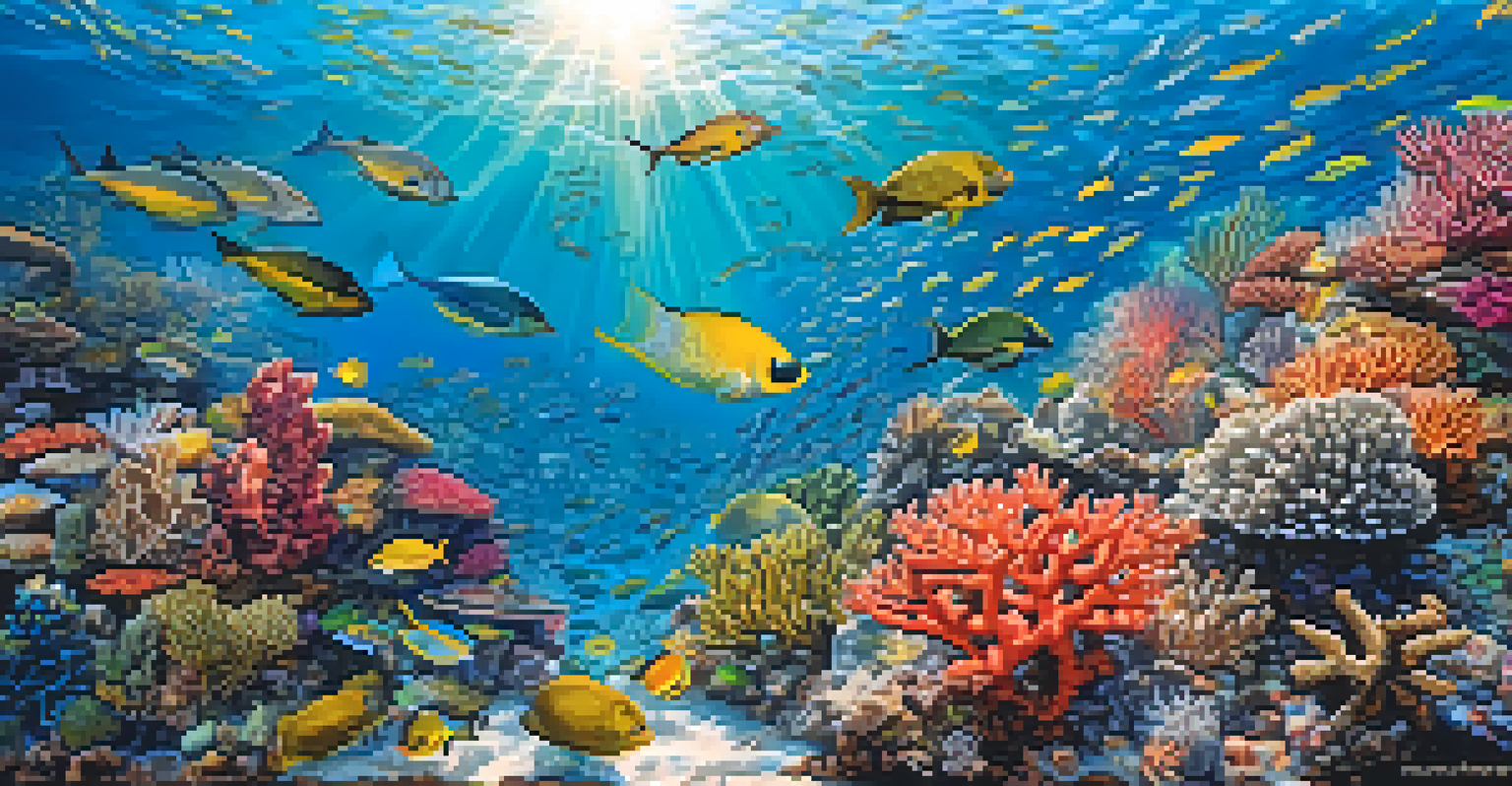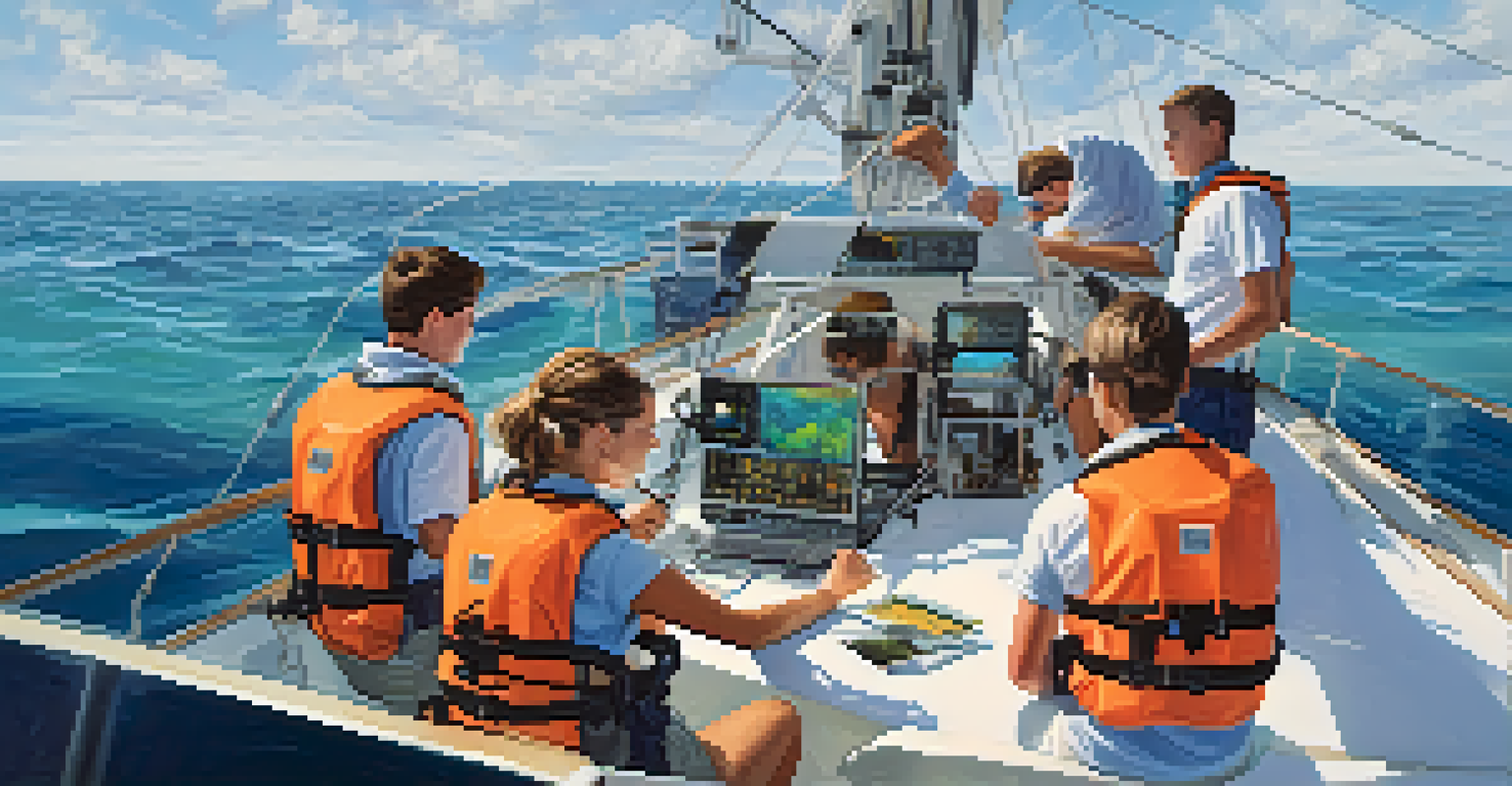The Role of Florida's Universities in Oceanographic Studies

Introduction to Florida's Oceanographic Landscape
Florida's coastline, with its vibrant marine ecosystems, serves as an ideal backdrop for oceanographic studies. The state's universities play a crucial role in harnessing this natural laboratory, contributing to our understanding of ocean health. From coral reefs to coastal wetlands, Florida is rich in biodiversity that researchers are eager to explore.
The ocean stirs the heart, inspires the imagination, and brings eternal joy to the soul.
These institutions not only focus on the local environment but also engage in global oceanographic research, addressing pressing issues like climate change and pollution. By studying Florida’s waters, scientists can gain insights that resonate far beyond state borders. This intersection of local and global perspectives makes Florida a vital hub for ocean research.
Moreover, the collaboration between universities and marine organizations enhances the impact of their findings. Together, they work to develop innovative solutions that benefit both the environment and the communities that depend on it. This synergy underscores the importance of institutional partnerships in advancing ocean science.
Key Universities Leading Oceanographic Research
Several universities in Florida are at the forefront of oceanographic studies. The University of Florida, for instance, has a renowned program dedicated to marine sciences that attracts researchers from around the world. With access to extensive field sites and cutting-edge labs, they tackle various ocean-related challenges.

Florida State University also contributes significantly, particularly through its Coastal and Marine Laboratory. Here, faculty and students engage in critical research that informs policy and conservation efforts, demonstrating the university's commitment to sustainable marine practices. Their focus on interdisciplinary studies broadens the scope of their research, making their findings more applicable to real-world challenges.
Florida's Role in Ocean Research
Florida's universities are vital hubs for oceanographic studies, addressing both local and global marine challenges.
Additionally, the University of Miami's Rosenstiel School of Marine and Atmospheric Science stands out with its emphasis on oceanography and atmospheric science. This institution fosters a collaborative environment where scientists can address complex issues like ocean currents and marine biodiversity. Together, these universities are shaping the future of ocean studies.
Innovative Research Projects in Oceanography
Florida's universities are involved in numerous innovative research projects that push the boundaries of oceanographic knowledge. For example, researchers are studying the effects of rising sea temperatures on coral reefs, seeking solutions to enhance their resilience. Such projects not only expand our understanding but also provide crucial data for conservation efforts.
We won't have a society if we destroy the environment.
Another significant area of research involves tracking marine life patterns and their responses to environmental changes. Using advanced technologies like drones and underwater sensors, scientists can gather real-time data that informs both academic and public policy decisions. This proactive approach has the potential to mitigate the impacts of climate change on marine ecosystems.
These projects often involve collaboration with governmental and non-governmental organizations, amplifying their impact. By working together, researchers can translate their findings into actionable strategies that benefit both the ocean and coastal communities. This commitment to innovation ensures that Florida remains a leader in oceanographic research.
Education and Training of Future Oceanographers
Education is a cornerstone of Florida's universities, particularly in nurturing the next generation of oceanographers. Degree programs in marine science and oceanography equip students with the necessary skills to tackle environmental challenges. Through hands-on experiences such as fieldwork and internships, students gain practical knowledge that complements their academic learning.
Moreover, many universities offer outreach programs aimed at involving the community in ocean conservation efforts. These initiatives not only raise awareness about marine issues but also inspire students to pursue careers in ocean sciences. By fostering a sense of stewardship, universities are ensuring that future generations remain committed to protecting our oceans.
Innovative Research Initiatives
Cutting-edge research projects in Florida focus on coral resilience and marine life tracking to combat climate change.
The mentorship provided by experienced faculty also plays a vital role in shaping students' careers. Faculty members often involve students in their research projects, providing invaluable guidance and networking opportunities. This supportive environment cultivates a passion for oceanography that extends beyond the classroom.
Community Engagement and Public Awareness
Florida's universities actively engage with the local community to promote public awareness of oceanographic issues. Through workshops, seminars, and public lectures, they share their research findings and highlight the importance of marine conservation. This outreach fosters a greater understanding of the ocean's role in our ecosystem and economy.
Many universities also host events such as beach clean-ups and citizen science initiatives, encouraging community participation in conservation efforts. These hands-on activities not only empower individuals to make a difference but also strengthen community ties around a shared goal. The impact of such initiatives can be profound, inspiring a collective commitment to protecting our oceans.
By bridging the gap between academia and the community, these institutions help cultivate a culture of environmental stewardship. Their efforts ensure that the research conducted within their walls translates into meaningful action in the real world, ultimately benefiting both marine ecosystems and society.
Addressing Climate Change Through Research
Climate change poses one of the greatest challenges to our oceans, and Florida's universities are responding with targeted research efforts. Many studies focus on understanding the impacts of rising sea levels, ocean acidification, and temperature changes on marine life. By uncovering these dynamics, researchers can inform strategies to mitigate these effects.
Collaborative research initiatives often involve partnerships with governmental agencies and environmental organizations. This collective approach allows for a more comprehensive understanding of climate change's effects on Florida's coastal ecosystems. By sharing data and resources, these entities can develop more effective conservation and adaptation strategies.
Community Engagement in Conservation
Through outreach and public initiatives, Florida's universities foster community involvement in ocean conservation efforts.
Furthermore, universities are actively involved in policy advocacy, ensuring that their research informs decision-makers. By presenting solid scientific evidence, they contribute to the formulation of policies aimed at protecting marine environments. This intersection of research and policy is crucial for creating a sustainable future in the face of climate challenges.
The Future of Oceanographic Studies in Florida
Looking ahead, the future of oceanographic studies in Florida appears promising, thanks in large part to its universities. With ongoing advancements in technology and research methodologies, there are exciting opportunities to explore the depths of our oceans. Innovative tools like remote sensing and artificial intelligence are set to enhance data collection and analysis.
As global challenges like climate change and habitat loss continue to escalate, the role of these universities will be even more critical. They will not only contribute to scientific discoveries but also educate and inspire future ocean stewards. The commitment to interdisciplinary research will further enhance their ability to address complex marine issues.

Ultimately, Florida's universities are poised to remain leaders in oceanographic research, shaping the understanding and conservation of our oceans. By fostering collaboration, innovation, and community engagement, they ensure that their impact is felt both locally and globally. The future of our oceans depends on the efforts of these institutions and the passionate individuals they educate.